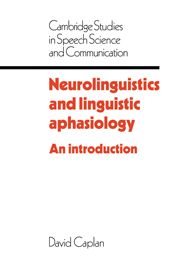Book contents
- Frontmatter
- Contents
- Preface
- Part I Introduction
- Part II Clinical aphasiology and neurolinguistics
- Part III Linguistic aphasiology
- 11 Linguistic descriptions and aphasic syndromes
- 12 Disturbances of lexical semantic representation
- 13 Disturbances of the sound system
- 14 Acquired dyslexia
- 15 Disturbances of sentence production: agrammatism
- 16 Disturbances of sentence comprehension
- 17 Overview of linguistic aphasiology
- Part IV Contemporary neurolinguistics
- References
- Author index
- Subject index
14 - Acquired dyslexia
Published online by Cambridge University Press: 10 December 2009
- Frontmatter
- Contents
- Preface
- Part I Introduction
- Part II Clinical aphasiology and neurolinguistics
- Part III Linguistic aphasiology
- 11 Linguistic descriptions and aphasic syndromes
- 12 Disturbances of lexical semantic representation
- 13 Disturbances of the sound system
- 14 Acquired dyslexia
- 15 Disturbances of sentence production: agrammatism
- 16 Disturbances of sentence comprehension
- 17 Overview of linguistic aphasiology
- Part IV Contemporary neurolinguistics
- References
- Author index
- Subject index
Summary
Reading and writing have often been considered “secondary” forms of language representation. Though all normal humans exposed to spoken language learn to speak and comprehend auditory language, many people do not learn to write or read, and many languages have never developed a written form. Normal children learn to use spoken language before they learn to use written language. For all these reasons, spoken language is undoubtedly the basic form of language, and written language a secondary means of expression. Nonetheless, written language is obviously an extremely valuable form of linguistic representation, since it allows humans to keep a permanent record of specific linguistic messages. Only very recent technological developments allow us to achieve this with spoken language. In this chapter, we shall consider aspects of the process of normal reading and its disturbances. As elsewhere, we shall begin by a consideration of the representations involved in reading – “orthographies” – and then proceed to consider the way these representations are processed and how the system breaks down. In this area especially, studies of brain-injured cases have contributed greatly to our understanding of how normal reading occurs.
Writing systems for language vary considerably in how they represent a language. They can be as different as Chinese characters and English letters. An important feature common to all orthographic systems, however, is that they all represent words of a language.
- Type
- Chapter
- Information
- Neurolinguistics and Linguistic AphasiologyAn Introduction, pp. 233 - 260Publisher: Cambridge University PressPrint publication year: 1987



